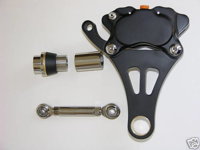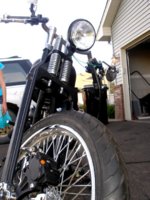Hey all, Im having troubles getting the pressure up on my front brake, this is a four piston caliper and im not sure if that would need a specific master cylinder to uphold this. If anyone has ran this setup please help me were stumped.
-
Enjoy XS650.com? Consider making a donation to help support the site.
XS650.com receives a small share of sales from some links on this page, but direct donations have a much greater impact on keeping this site going.
You are using an out of date browser. It may not display this or other websites correctly.
You should upgrade or use an alternative browser.
You should upgrade or use an alternative browser.
Brakes wont build enough pressure
You just have air in the lines/caliper.
When I install a new brake line, I pre-fill the line with brake fluid. I use a syringe to inject brake fluid into the brake line, before its installed. After installation, it only requires a small amount of bleeding.
The master cylinder is not designed to pump any volume of fluid, so with an empty line it will take a while to bleed the air.
When I install a new brake line, I pre-fill the line with brake fluid. I use a syringe to inject brake fluid into the brake line, before its installed. After installation, it only requires a small amount of bleeding.
The master cylinder is not designed to pump any volume of fluid, so with an empty line it will take a while to bleed the air.
Not arguing with you retired at all, i beleive your very right on this actually but this is what i saw that made me worry, but if that is the case a smaller bore is what i need im sure im fine but trust me when i say im slightly frustrated.
In a master cylinder, pressure is applied to a cylinder of fluid by a lever. The amount of force and travel applied to a given diameter of the piston produces a given pressure and volume of fluid to the slave cylinder or caliper(s). Supplying the wrong pressure or volume will result in no brakes. Either from a lack of volume (pedal/lever bottoms before brakes cylinder fills) or lack of pressure (you can't apply enough force to the pedal/lever to produce enough pressure at the brake cylinder).
A small bore (say 5/8") master cylinder has high pressure but low volume. A large bore master cylinder (say 3/4") has lower pressure but higher volume.
A small bore M/C is usually attached to smaller piston calipers and usually multiple pistons to take advantage of hydraulic pressures but at small volume (they don't have to move far). A larger bore M/C usually works with larger single piston calipers (again not moving far) but take advantage of less pressure over a larger piston to get the needed pad pressure. A small caliper piston takes low volume high pressure, a larger caliper piston takes high volume but lower pressure to exert similar pad pressure. It is basically a matter of piston surface area and travel that dictates volume and pressure needs (basic hydraulics).
In a master cylinder, pressure is applied to a cylinder of fluid by a lever. The amount of force and travel applied to a given diameter of the piston produces a given pressure and volume of fluid to the slave cylinder or caliper(s). Supplying the wrong pressure or volume will result in no brakes. Either from a lack of volume (pedal/lever bottoms before brakes cylinder fills) or lack of pressure (you can't apply enough force to the pedal/lever to produce enough pressure at the brake cylinder).
A small bore (say 5/8") master cylinder has high pressure but low volume. A large bore master cylinder (say 3/4") has lower pressure but higher volume.
A small bore M/C is usually attached to smaller piston calipers and usually multiple pistons to take advantage of hydraulic pressures but at small volume (they don't have to move far). A larger bore M/C usually works with larger single piston calipers (again not moving far) but take advantage of less pressure over a larger piston to get the needed pad pressure. A small caliper piston takes low volume high pressure, a larger caliper piston takes high volume but lower pressure to exert similar pad pressure. It is basically a matter of piston surface area and travel that dictates volume and pressure needs (basic hydraulics).
bobber bill
XS650 Addict
- Messages
- 296
- Reaction score
- 1
- Points
- 16
I'm running a 16mm master with a single 4 piston caliper. Works great
It helps to wiggle your lines and lightly tap the caliper and master cylinder with a rubber mallet. This encourages the bubbles to move up and out of the system. Also, master cylinders with their own bleeder screw are far easier to work with.
It helps to wiggle your lines and lightly tap the caliper and master cylinder with a rubber mallet. This encourages the bubbles to move up and out of the system. Also, master cylinders with their own bleeder screw are far easier to work with.
sgallaty
Antihero
it's a mechanical force system. very simple in theory.
if your caliper ratio is wrong 'enough', you can end up with very little lever motion, and not enough force on the calipers (too large of an MC caliper), and if you have much too small of a hydraulic displacement, you'll end up with a very long throw on the lever to generate force, but you'll be able to generate more force.
in either case however, you'll be looking at a linear force - you won't ever 'build' pressure.
I recommend a pressure bleeding. sink a line into a bell jar with brake fluid in it, open your MC and keep it full of fluid and pump the whole system out until the tiny bubbles stop coming out.
Possible causes for this problem are air in your lines, compromised brake hoses or water in your brake fluid (which can cause elasticity)
if your lever feels 'springy' at all instead of firm, you've got some compromise of the hydraulic system
if your caliper ratio is wrong 'enough', you can end up with very little lever motion, and not enough force on the calipers (too large of an MC caliper), and if you have much too small of a hydraulic displacement, you'll end up with a very long throw on the lever to generate force, but you'll be able to generate more force.
in either case however, you'll be looking at a linear force - you won't ever 'build' pressure.
I recommend a pressure bleeding. sink a line into a bell jar with brake fluid in it, open your MC and keep it full of fluid and pump the whole system out until the tiny bubbles stop coming out.
Possible causes for this problem are air in your lines, compromised brake hoses or water in your brake fluid (which can cause elasticity)
if your lever feels 'springy' at all instead of firm, you've got some compromise of the hydraulic system
Thanx for the tips, ill do my best to encourage the tiny bubbles out lol.... and yeah will prolly get the tool that helps bleed em with pressure. Yes bobber bill it would be nice if the MC had a bleeder screw, I am pretty sure thats where the air is getting hung up!
visimpact
XS650 Addict
I just went thru it on my bike (stock caliper aftermarket quad master)but it turned out to be a bad bleeder on it. Changed it out and it's perfect now. I fought with it for a few hours and just couldn't get the air out. switched the bleeder and its perfect now. Probably not ur issue but start at the easy stuff and work ur way further in.
racerdave
^ Gone not forgotten ^
Try bleeding it backwards. Force brake fluid up from the caliper to the master. Use a syringe or even a old style oil pump can
sgallaty
Antihero
Also if the fluid is cloudy at ALL, it's compromised. Always use new fluid, always and don't put dot-5 in a dot-3 system. It'll make you very, very sad.
sgallaty
Antihero
If it's a dot-5 system, then you're good to go. Don't mix em, and always use a fresh container no matter how full the old one is.
Tomterrific
XS650 Junkie
DOT 5 holds air bubbles and is squishy. I've had problems starting out with a dry MC. Best for me is to remove the line from the MC and put my finger over the end to act as a valve. This bleeds the MC and then it can pump better. Still takes a looooong time if the lines and calipers are empty.
Tom Graham
Tom Graham
sgallaty
Antihero
when bleeding mostly empty brakes I also find that it helps to let the MC lever 'snap back' to get more fluid to pump in the system. not sure why that works. but it does help sometimes.
TeeCat
One-Mik Wonder
I'm following this thread with interest. I'm waiting to hear from Mike Morse on a kit for my stock caliper, braided replacement line (one piece versus two as in stock), and I'll likely replace my M/C with a new stock type because a rebuild is more than half the cost of a replacement. I have never done this before. so I'm trying to absorb as much info as I can. Hope you get/have gotten this sorted!
TC
TC
Capt_Zoom
Raider Rider/xs newbie
Get some speedbleeders. They make the job quick and easy. I think they cost about $8 and will make your life a lot easier when dealing with brakes. with speedbleeders I can complete bleed a dry system in about 5 minutes.
Okay I figured out the problem, we did bleed the brakes in reverse (caliper to top line), we then bled the mc with our thumb over the exit. than we bled them regulary with the screw. but still no pressure... We pulled the caliper and checked for adjusting issue and ding found the problem... after testing our ideas we found that the caliper was not pressing on the non adjusting side with the rotor and with that wouldnt adjust to the rotor, we checked our spacing on the axle to play with and couldnt come up with enough to give it the pressure we needed. the only way we found was to put washers between the caliper and the caliper mount, it works this way but im not sure how safe it is.. any info anyone has on this? Thank you!
Last edited:


